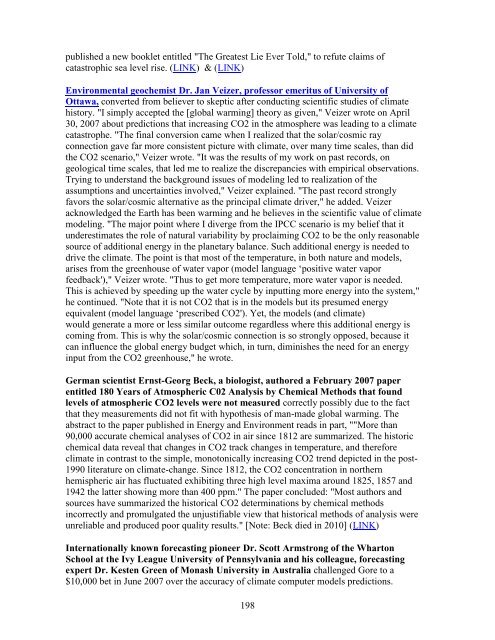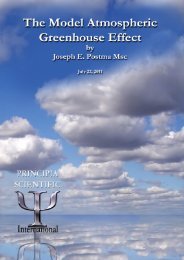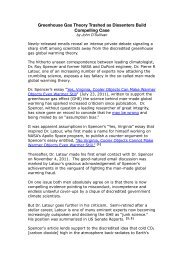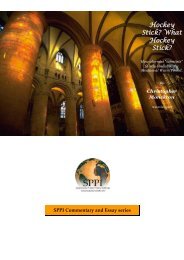Than 1000 International Scientists Dissent Over Man-Made Global ...
Than 1000 International Scientists Dissent Over Man-Made Global ...
Than 1000 International Scientists Dissent Over Man-Made Global ...
Create successful ePaper yourself
Turn your PDF publications into a flip-book with our unique Google optimized e-Paper software.
published a new booklet entitled "The Greatest Lie Ever Told," to refute claims of<br />
catastrophic sea level rise. (LINK) & (LINK)<br />
Environmental geochemist Dr. Jan Veizer, professor emeritus of University of<br />
Ottawa, converted from believer to skeptic after conducting scientific studies of climate<br />
history. "I simply accepted the [global warming] theory as given," Veizer wrote on April<br />
30, 2007 about predictions that increasing CO2 in the atmosphere was leading to a climate<br />
catastrophe. "The final conversion came when I realized that the solar/cosmic ray<br />
connection gave far more consistent picture with climate, over many time scales, than did<br />
the CO2 scenario," Veizer wrote. "It was the results of my work on past records, on<br />
geological time scales, that led me to realize the discrepancies with empirical observations.<br />
Trying to understand the background issues of modeling led to realization of the<br />
assumptions and uncertainties involved," Veizer explained. "The past record strongly<br />
favors the solar/cosmic alternative as the principal climate driver," he added. Veizer<br />
acknowledged the Earth has been warming and he believes in the scientific value of climate<br />
modeling. "The major point where I diverge from the IPCC scenario is my belief that it<br />
underestimates the role of natural variability by proclaiming CO2 to be the only reasonable<br />
source of additional energy in the planetary balance. Such additional energy is needed to<br />
drive the climate. The point is that most of the temperature, in both nature and models,<br />
arises from the greenhouse of water vapor (model language ‗positive water vapor<br />
feedback')," Veizer wrote. "Thus to get more temperature, more water vapor is needed.<br />
This is achieved by speeding up the water cycle by inputting more energy into the system,"<br />
he continued. "Note that it is not CO2 that is in the models but its presumed energy<br />
equivalent (model language ‗prescribed CO2'). Yet, the models (and climate)<br />
would generate a more or less similar outcome regardless where this additional energy is<br />
coming from. This is why the solar/cosmic connection is so strongly opposed, because it<br />
can influence the global energy budget which, in turn, diminishes the need for an energy<br />
input from the CO2 greenhouse," he wrote.<br />
German scientist Ernst-Georg Beck, a biologist, authored a February 2007 paper<br />
entitled 180 Years of Atmospheric C02 Analysis by Chemical Methods that found<br />
levels of atmospheric CO2 levels were not measured correctly possibly due to the fact<br />
that they measurements did not fit with hypothesis of man-made global warming. The<br />
abstract to the paper published in Energy and Environment reads in part, ""More than<br />
90,000 accurate chemical analyses of CO2 in air since 1812 are summarized. The historic<br />
chemical data reveal that changes in CO2 track changes in temperature, and therefore<br />
climate in contrast to the simple, monotonically increasing CO2 trend depicted in the post-<br />
1990 literature on climate-change. Since 1812, the CO2 concentration in northern<br />
hemispheric air has fluctuated exhibiting three high level maxima around 1825, 1857 and<br />
1942 the latter showing more than 400 ppm." The paper concluded: "Most authors and<br />
sources have summarized the historical CO2 determinations by chemical methods<br />
incorrectly and promulgated the unjustifiable view that historical methods of analysis were<br />
unreliable and produced poor quality results." [Note: Beck died in 2010] (LINK)<br />
<strong>International</strong>ly known forecasting pioneer Dr. Scott Armstrong of the Wharton<br />
School at the Ivy League University of Pennsylvania and his colleague, forecasting<br />
expert Dr. Kesten Green of Monash University in Australia challenged Gore to a<br />
$10,000 bet in June 2007 over the accuracy of climate computer models predictions.<br />
198





